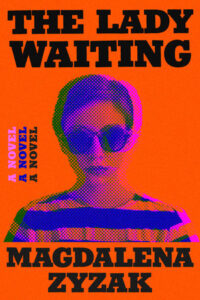
Writing With “Sprezz.” On the Art of Saying Just Enough
Magdalena Zyzak Wonders If It’s Possible to Craft Effortlessly Cool Prose
You might have heard about sprezzatura. Baldassare Castiglione, in The Book of the Courtier, defined it as “a certain nonchalance that shall conceal design and show that what is done and said is done without effort and almost without thought.” That was 1528. You might have read about it more recently in the New Yorker, where Roger Angell, paraphrasing George Frazier, defines sprezzatura as “spirit and nonchalance: cool.” Sprezzatura is superficial, surface, costume. Yet it comes from a deep awareness of the tragic.
In my novel, The Lady Waiting, the characters use the term “sprezz,” a sprezzier version of sprezzatura, spun for the 21st century, less refined, less defined. My characters ballpark it as follows: “Anything well planned that looks accidental is sprezzy…Gowns with tennis shoes or dress shoes at the gym are sprezzy… Neckties with robes. Girls in boyfriends’ shirts… Reciting Lu Xun in the original to your Chinese friends without having mentioned you speak Chinese.” Sprezz is effortlessness with hidden effort. Sprezz is never quoting from your own novel.
The well planned, at its best, looks accidental.
High heels on a hike—unsprezzy. Heels on a bike—maybe sprezzy, if you’re on your way to work. Heels in the rubble of blitzed London, per the famous WWII photograph—sprezzy. We should try to live with sprezz. If we must live and write, it follows we should write with sprezz. I’ve collected a few loose principles for writing with sprezz. Don’t take them too seriously. Sprezz can never be rigorously or officially codified. Sprezz is never voted on by committees.
Sometimes the heartrending must be concealed, appearing only for a glimpse. Effortlessness of feeling is feeling. In Paolo Sorrentino’s film The Great Beauty, Jep Gambardella and his date are shopping for a funeral. As she tries on a dress in a luxury store, he unveils his rule for funerals—“You must never forget that at a funeral you are appearing on stage.” There’s a perfect line to deliver, he claims, a perfect dress to wear.
One rule should never be broken: when attending a funeral of a friend, one must never cry, in order not to distract from the grief of the family, not to “steal the spectacle.” In the next scene, dry-eyed Jep attends the funeral. So far so good. And yet, when he lifts his corner of the coffin, he begins to weep loudly. Pallbearer Jep is causing a spectacle. Jep is in the throes of the most authentic feeling (and so is the viewer).
This superposition of flippancy and authenticity, this exposure of grief through lightness—is sprezzy writing. If, perhaps, Jep is not at his sprezziest here, Sorrentino is. Without the superficial preamble at the store, we would not have the same reaction to Jep’s tears at the funeral. It saves Sorrentino from sentimentality, and sentimentality, per Wallace Stevens’ dictum, “is a failure of feeling.”
If the content of a narrative can be sprezzy, what about the form? What should fiction wear to be sprezzy? Again, there is no uniform. But there are examples. Amy Hempel’s short story “Offertory” begins: “We did it twelve times—made love, all of us, to one another twelve times, the two of them doing everything two people could do to me twelve times. I was going to say only twelve times, but it wasn’t ‘only,’ was it? It was wonderful.”
It’s hard to write about sex without inducing cringes. Hempel writes about it well. The matter-of-factness of her description, the slyness of “was it?,” the simple, almost childlike “wonderful” to sum up this very adult experience… the common modes writers employ when writing about sex, from mannered caution to purple raunch (not that one should have anything against raunch), are missing. Omittance, detachment, taciturnity, elements of what we sometimes call elliptical writing (Salter, Didion, Hemingway), brings sprezz to sex in fiction and sprezz to fiction in general. Sprezz is saying just enough.
There is inherent unsprezz in the act of writing or talking about sprezz.
Sunglasses at night—unsprezzy. Except on those rare individuals with charisma enough to make you believe the witching hour’s too bright. There are writers whose baroque sentences leave nothing unsaid (Nabokov, McCarthy, Brodkey), yet who are sprezzy nonetheless. In his thirty-page-long story “Innocence,” Brodkey offers twenty pages of linguistic acrobatics on a single session of cunnilingus. The effect of these twenty pages is not labored. On the contrary. He makes us pity those who have committed mere sentences to the act. Sometimes sprezz is saying more than enough. Sprezz is knowing how to stealthily steal the show.
Which brings me to my last consideration—can sprezz be applied to the physical act of fiction writing?
Fiction writing is only effortless on screen. Inevitably, two-thirds through every writer biopic, we are subjected to the infamous “inspiration montage,” during which, after weeks or years of agonizing writers’ block, the daemon strikes, and the rattled, wild-haired writer pounds her typewriter to death. In what seems like a matter of days, corresponding roughly to twenty screen seconds, out comes a book. Unless you’re Kerouac on Benzedrine, that’s not how writing fiction works. The weighty masonry of words must be laid down, preferably daily. And yet this very necessity, the humdrum quota, is antithetical to inspiration. Where’s the sprezz?
In fact, the daily dullard act of writing, editing, rewriting, editing, rewriting, and editing some more is Castiglione’s “concealed design.” The well planned, at its best, looks accidental. Only your writerly kin, grimacing at desks around the world, catch an acrid whiff of the residue of how many lost hours, fathom what design has been concealed on every page. Maybe I lost a week of whatever is left of my life writing this breezy squib. You’ll never know. Sunglasses conceal tears.
Is sprezz a particle or a wave? It does seem to obey Heisenberg’s uncertainty principle. There is inherent unsprezz in the act of writing or talking about sprezz; the more one goes on about sprezz, the less sprezz one’s got. Perhaps sprezz is something I lack. I’m going to go cry now.
__________________________________

The Lady Waiting by Magdalena Zyzak is available from Riverhead Books, an imprint of Penguin Publishing Group, a division of Penguin Random House, LLC.
Magdalena Zyzak
Magdalena Zyzak was born in Silesia, Poland. She received her MFA in creative writing from Columbia University. She is the author of the novel The Ballad of Barbabas Pierkiel, hailed as “a wickedly good debut” by the Los Angeles Times. Also a filmmaker, she has written, directed, and produced several motion pictures, including Redland, which was nominated for an Independent Spirit Award, and Maya Dardel, released internationally by Samuel Goldwyn Pictures and MGM/Orion. Zyzak has been honored as an outstanding cultural figure in the Polish community abroad by the Teraz Polska, a cultural foundation.



















